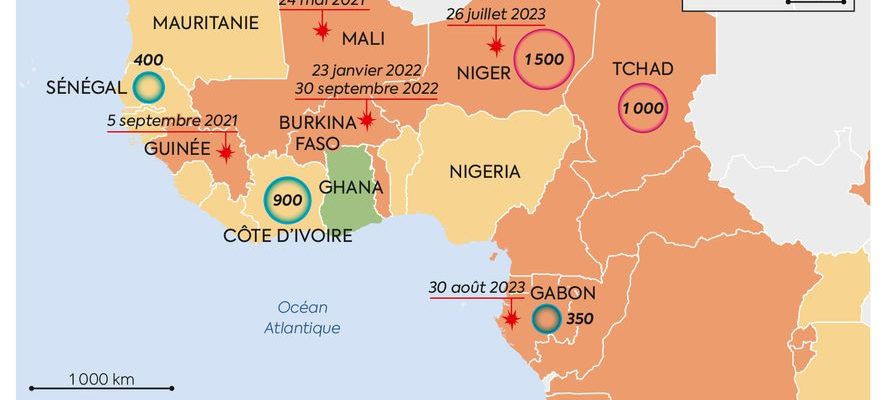The deposed president of Gabon, Ali Bongo Ondimba, is “free of his movements” and “can go” abroad for medical reasons, announced on Wednesday General Brice Oligui Nguema who overthrew him a week ago.
Ali Bongo Bongo, 64, in power for 14 years, had been under house arrest since the August 30 military coup, carried out without bloodshed less than an hour after his side declared his re-election in a qualified ballot fraudulent by the putschists.
The power of General Oligui, proclaimed President of the Transition, also accuses the family circle, in particular his wife and one of his sons, both in detention, as well as members of his cabinet, of having embezzled “massively public funds ” and ruled the country “irresponsibly and unpredictably” by manipulating an Ali Bongo weakened by a serious stroke in 2018.
He appears on public television
“Given his state of health, the former President of the Republic Ali Bongo Ondimba is free to move around. He can, if he wishes, go abroad to carry out his medical checks”, announced the soldiers in a press release, read on public television, from General Oligui, who had led the putsch.
Ali Bongo was shown a few minutes later by public television receiving at his home Abdou Abarry, Special Representative in Central Africa of the Secretary General of the UN. We see him smiling and still moving with difficulty since his stroke, but without his usual cane.
The coup led by General Oligui
On August 30, in the middle of the curfew decreed on election day, in the middle of the night and after his government had cut off the internet throughout the country, Ali Bongo was proclaimed re-elected to the presidential election of August 26 with nearly 65% voices. Less than an hour later, soldiers announced on state television that they had “put an end” to his regime.
A coup carried out without bloodshed, the putschists accusing the Bongo camp of having grossly rigged the ballot and falsified its results.
The coup was led by General Oligui, who rallied all the army and police forces behind him, and drew the support of almost all the parties of the former opposition and a part of the ex-majority as well as a massive outpouring of a population thanking him for having “liberated” it from 55 years of “Bongo dynasty” in power.
This 48-year-old paratrooper, yet head of the powerful and feared Presidential Guard (GR), the praetorian guard responsible for protecting the heart of power, was sworn in on Monday as President of a transition whose he did not set the date. duration. And he promised to “hand over power to civilians” at the end of this transition, after having adopted “by referendum” a new Constitution which will have to be drawn up with the participation of “all the living forces of the Nation”. and which will lead to “free and transparent elections”.
3766 cover africa map military presence
© / Cartography legends
President’s son arrested
The day after the coup, the soldiers arrested one of the deposed president’s sons, Noureddin Bongo Valentin, and six other young members of the close guard of the head of state and his wife Sylvia Bongo, showing them on television, during searches of their homes, at the foot of trunks, suitcases and bags overflowing with banknotes for the equivalent of hundreds of millions of euros.
And, as the opposition had been doing for several years, the putschists accused Sylvia and her son Noureddin of having been the “true leaders of the country” and at the heart of a gigantic network of corruption, in particular by manipulating the head of the state which does not have prisoner status. Her Parisian lawyers announced that Sylvia Bongo was “detained incommunicado” and “arbitrarily” somewhere in Gabon.
Noureddin Bongo and the six other so-called members of the “Young Guard” of the presidential palace, are detained in particular “high treason, massive embezzlement of public funds, international financial embezzlement in an organized gang, forgery and use of forgery, falsification of the president’s signature of the Republic, active corruption, drug trafficking”.
Ali Bongo was elected in 2009 on the death of his father Omar Bongo Ondimba, who for more than 41 years had ruled this small state among the richest in Africa thanks to its oil but where a third of the inhabitants live below the poverty line. .
